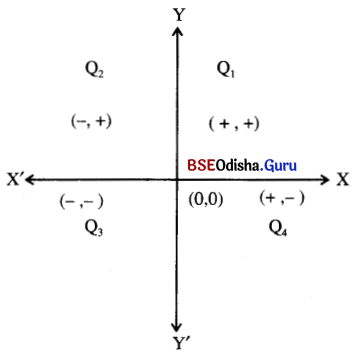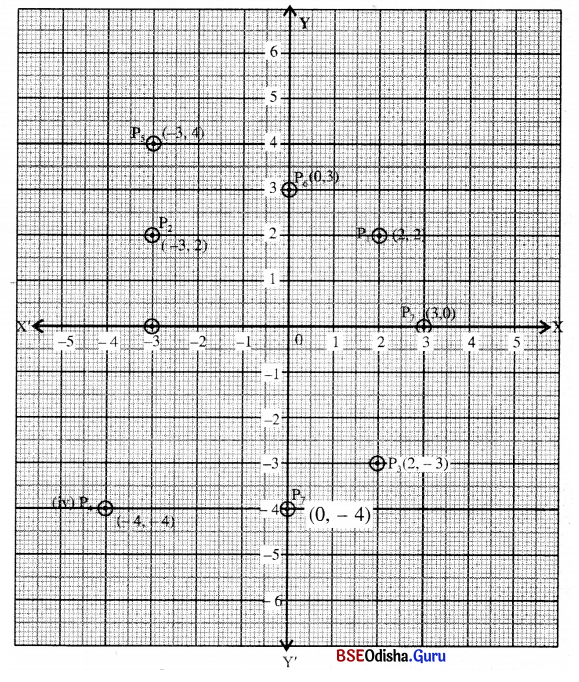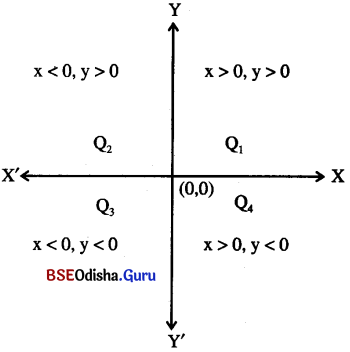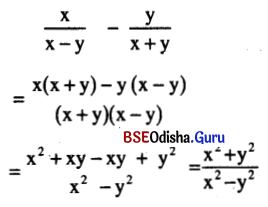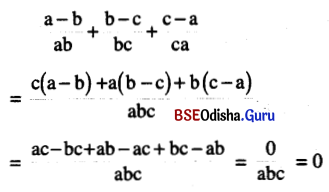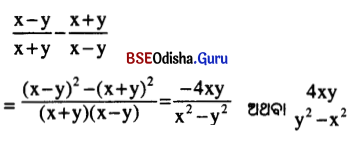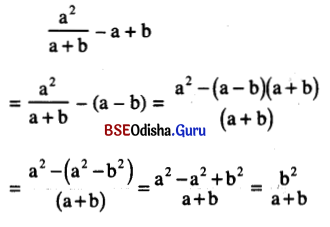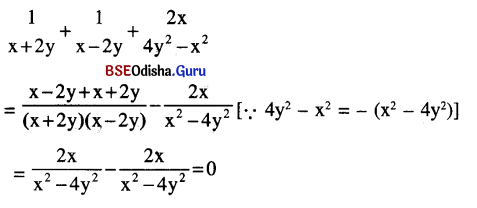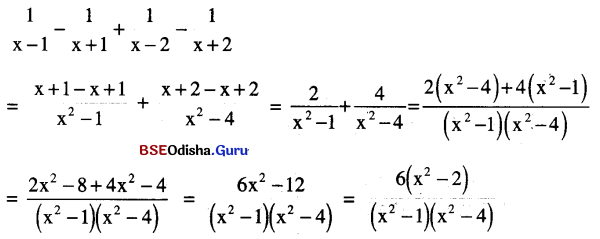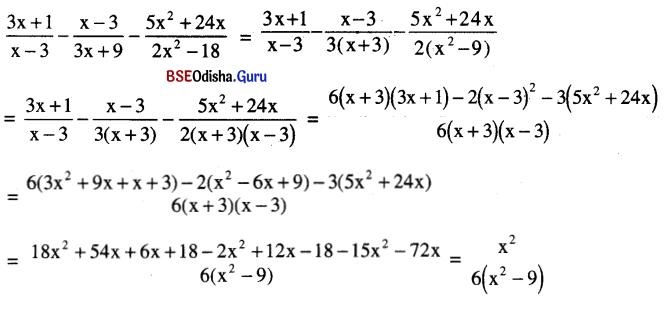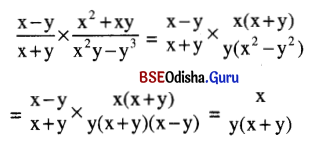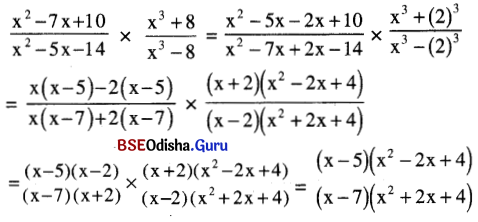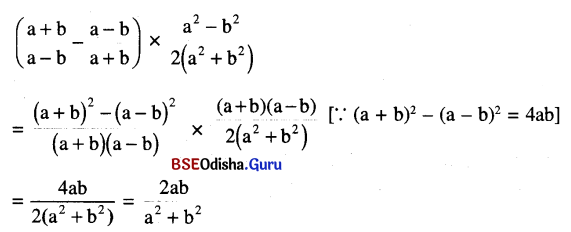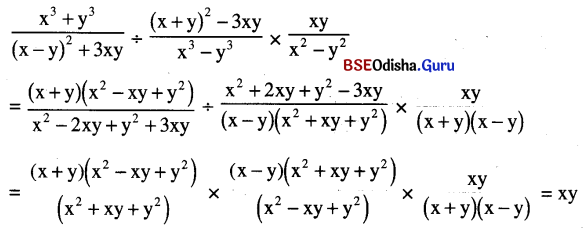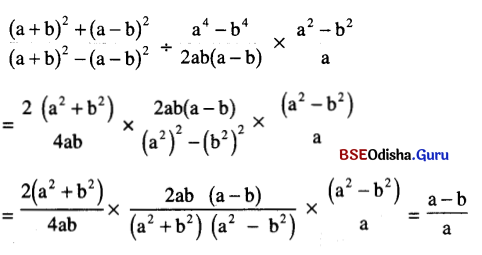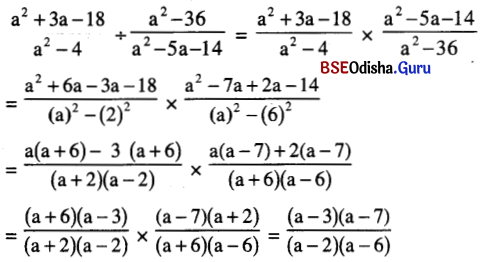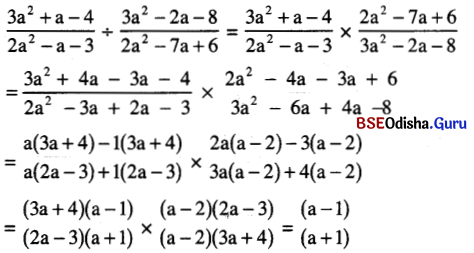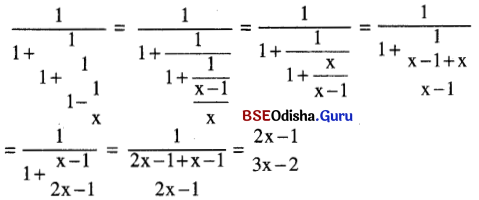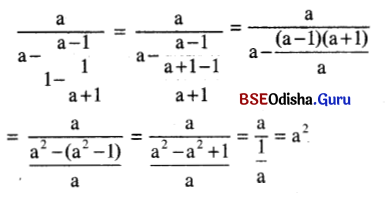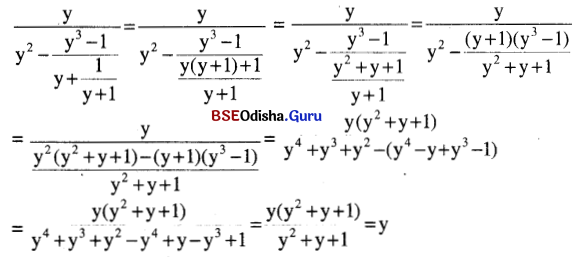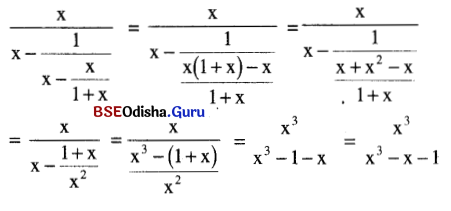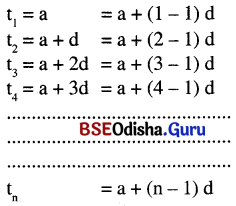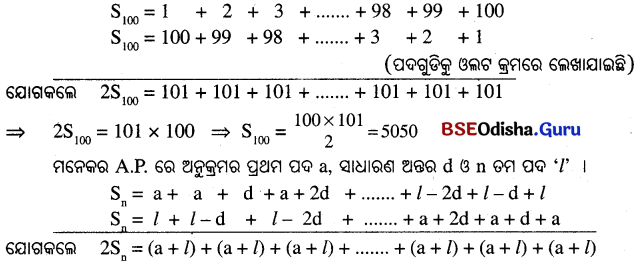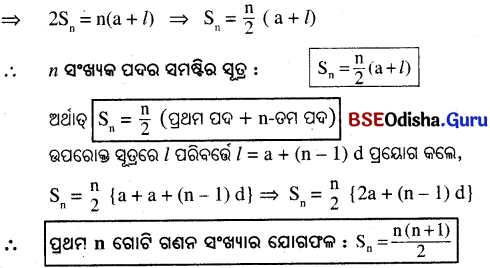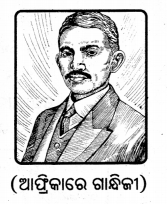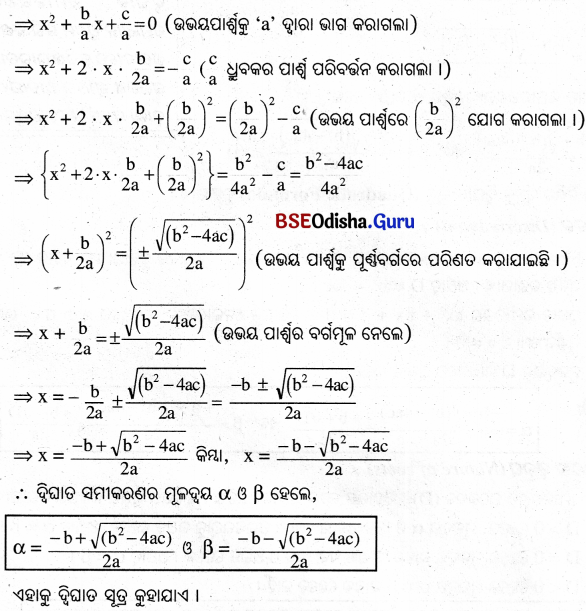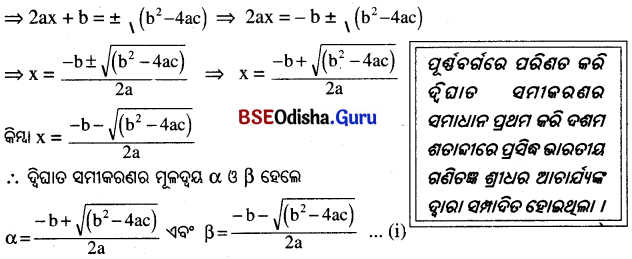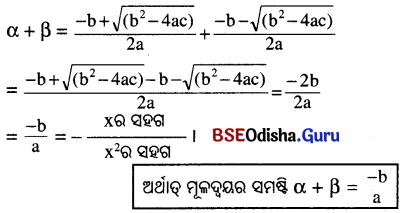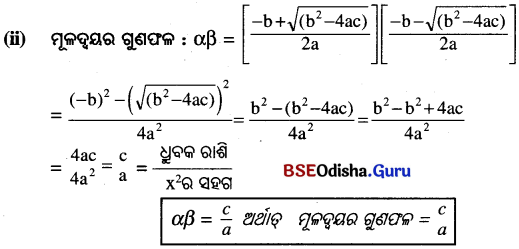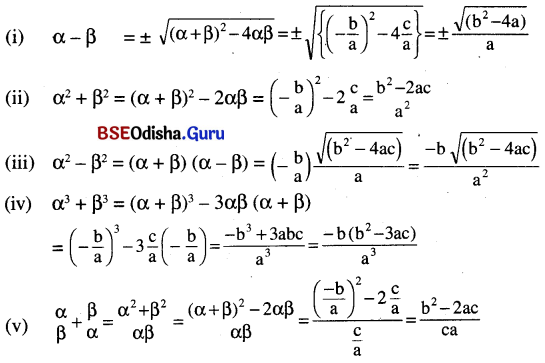Odisha State Board BSE Odisha 9th Class Maths Solutions Algebra Chapter 3 ବୀଜଗାଣିତିକ ପରିପ୍ରକାଶ ଓ ଅଭେଦ Ex 3(d) Textbook Exercise Questions and Answers.
BSE Odisha Class 9 Maths Solutions Algebra Chapter 3 ବୀଜଗାଣିତିକ ପରିପ୍ରକାଶ ଓ ଅଭେଦ Ex 3(d)
Question 1.
ଗ.ସା.ଗୁ. ନିର୍ଣ୍ଣୟ କର :
(i) xy2, x2y
ସମାଧାନ:
xy2 = x × y × y
x2y = x × x × y
∴ ନିର୍ଣ୍ଣେୟ ଗ.ସା.ଗୁ.
(ii) 6a3b2, 8a2b3
ସମାଧାନ:
6a3b2 = 2 × 3 × a × a × a × b × b
8a2b3 = 2 × 2 × 2 × a × a × b × b × b
∴ ନିର୍ଣ୍ଣେୟ ଗ.ସା.ଗୁ.. = 2 × a × a × b × b = 2a2b2
(iii) 12a2b4c, 15ab2c3
ସମାଧାନ:
12a2b4c = 2 × 2 × 3 × a × a × b × b × b × b × c
15ab2c3 =3 × 5 × a × b × b × c × c × c
∴ ନିର୍ଣ୍ଣେୟ ଗ.ସା.ଗୁ. = 3 × a × b × b × c = 3ab2c
(iv) x2y2, x3y, xy3
ସମାଧାନ:
x2y2 = x × x × y × y
x3y = x × x × x × y
xy3 = x × y × y × y
∴ ନିର୍ଣ୍ଣେୟ ଗ.ସା.ଗୁ. = xy
(v) 144x3y9z7, 108x6y6z6
ସମାଧାନ:
144x3y9z7 = 22 × 22 × 32 × x3 × y3 × y3 × y3 × z × z6
108x6y6z6 = 22 × 32 × 3 × x3 × x3 × y3 × y3 × z6
∴ ନିର୍ଣ୍ଣେୟ ଗ.ସା.ଗୁ. = 22 × 32 × x3 × y3 × y3 × z6 = 36x3y6z6

Question 2.
ଗ.ସା.ଗୁ. ନିର୍ଣ୍ଣୟ କର :
(i) x2 – 1, x2 + x
ସମାଧାନ:
x2 – 1 = (x + 1) ( x – 1)
x2 + x = x(x + 1)
∴ ନିର୍ଣ୍ଣେୟ ଗ.ସା.ଗୁ. = (x + 1)
(ii) a3 – ab2, a3 – b3
ସମାଧାନ:
a3 – ab2 = a(a2 – b2) = a(a + b) (a – b)
a3 – b3 = ( a – b) (a2 + ab + b2)
∴ ନିର୍ଣ୍ଣେୟ ଗ.ସା.ଗୁ. = (a – b)
(iii) 4a2 – b2, b2 – 2ab
ସମାଧାନ:
4a2 – b2 = (2a)2 – (b)2 = (2a + b) (2a – b)
b2 – 2ab = -(2ab – b2) = -b(2a – b)
∴ ନିର୍ଣ୍ଣେୟ ଗ.ସା.ଗୁ. = (2a – b)
(iv) (x – 1)3, (1 – X)2
ସମାଧାନ:
(x – 1)3 = (x – 1) (x – 1) (x – 1)
(1 – x)2 = {-(x – 1)}2 = (x – 1)(x – 1)
∴ ନିର୍ଣ୍ଣେୟ ଗ.ସା.ଗୁ. = (x – 1)(x – 1) = (x – 1)2
(v) x2 – xy + y2, x4 + x2y2 + y4
ସମାଧାନ:
(x2 – xy + y2) = (x2 – xy + y2)
(x4 + x2y2 + y4) = (x2 + xy + y2)(x2 – xy + y2)
∴ ନିର୍ଣ୍ଣେୟ ଗ.ସା.ଗୁ. = (x2 – xy + y2)
(vi) 6(a2 – 4b2), 10(a3 – 8b3)
ସମାଧାନ:
6(a2 – 4b2) = 2 × 3 {(a)2 – (2b)2}
= 2 × 3 (a + 2b) (a- 2b) 10(a3 – 8b3)
= 2 × 5 {(a)3 – (2b)3}
= 2 x 5 (a – 2b) (a2 + 2ab + 4b2)
∴ ନିର୍ଣ୍ଣେୟ ଗ.ସା.ଗୁ. = 2(a – 2b)
(vii) x2 + 7x + 12, x2 + 9x + 20
ସମାଧାନ:
x2 + 7x + 12 = x2 + 4x + 3x + 12
= x (x + 4) + 3 (x + 4)
= (x + 4) (x + 3)
x2 + 9x + 20 = x2 + 5x + 4x + 20
= x (x + 5) + 4(x + 5)
= (x + 5) ( x + 4)
∴ ନିର୍ଣ୍ଣେୟ ଗ.ସା.ଗୁ. = (x + 4)
(viii) 4x3 – 9x, 16x3 + 54, 2x2 + 5x + 3
ସମାଧାନ:
4x3 – 9x = x (4x2 – 9) = x {(2x)2 – (3)2} = x (2x + 3)(2x – 3)
16x3 + 54 = 2(8x3 + 27) = 2{(2x)3 + (3)3}
= 2 (2x + 3) (4x2 – 6x + 9)
2x2 + 5x + 3 = 2x2 + 3x + 2x + 3
= x (2x + 3) + 1(2x + 3) = (2x + 3) (x + 1)
∴ ନିର୍ଣ୍ଣେୟ ଗ.ସା.ଗୁ. = (2x + 3)
(ix) a2 – b2 – c2 – 2bc, a2 + b2 – c2 + 2ab
ସମାଧାନ:
a2 – b2 – c2 + 2bc = a2 – (b2 + c2 – 2bc) = (a)2 – (b- c)2 = (a + b – c) (a – b + c)
a2 + b2 – c2 + 2ab = (a2 + b2 + 2ab) – c2 = (a + b)2 – (c)2 = (a + b + c) (a + b – c)
∴ ନିର୍ଣ୍ଣେୟ ଗ.ସା.ଗୁ. = (a + b – c)
(x) a2 – b2 – c2 – 2bc, b2 – c2 – a2 – 2ca, c2 – a2 – b2 – 2ab
ସମାଧାନ:
a2 – b2 – c2 – 2bc = a2 – (b2 + c2 + 2bc) = (a)2 – (b + c)2 = (a + b + c)(a – b – c)
b2 – c2 – a2 – 2ca = b2 – (c2 + a2 + 2ca) = (b)2 – (c + a)2 = (b + c + a)(b – c – a)
c2 – a2 – b2 – 2ab = c2 – (a2 + b2 + 2ab) = (c)2 – (a + b)2 = (c + a + b)(c – a – b)
∴ ନିର୍ଣ୍ଣେୟ ଗ.ସା.ଗୁ. = (a + b + c)
(xi) 8a2 – 14 ab + 6b2, 15a2 + 18ab – 33b2, 9a2b – 7ab2 – 2b3
ସମାଧାନ:
8a2 – 14ab + 6b2 = 2(4a2 – 7ab + 3b2) = 2 (4a2 – 4ab -3ab + 3b2)
= 2 {4a(a – b) -3b(a – b)} = 2(a – b)(4a – 3b)}
15a2 + 18ab – 33b2 = 15a2 + 33ab – 15ab – 33b2
= 3a(5a + 11b) – 3b(5a + 11b) = (5a + 11b)(3a – 3b) = 3(5a + 11b)(a – b)
9a2b – 7ab2 – 2b3 = b(9a2 – 7ab – 2b2)
= b(9a2 – 9ab + 2ab – 2b2) = b{9a (a – b) + 2b(a – b)} = b(a – b) (9a + 2b)
∴ ନିର୍ଣ୍ଣେୟ ଗ.ସା.ଗୁ. = (a – b)
(xii) (a + b) x2 – (2a + b) bx + ab2, (a- b) x2 – (2a – b) bx + ab2
ସମାଧାନ:
(a + b)x2 – (2a + b) bx + ab2
= (a + b)x2 – {(a + b) + a} bx + ab2 = (a + b)x2 – (a + b)bx – abx + ab2
= (a + b)x (x – b) – ab(x – b) = (x – b) {(a + b) x – ab}
= (x – b) (ax + bx – ab)
(a- b)x2 – (2a – b)bx + ab2
= (a – b)x2 – {(a – b) + a} bx + ab2 = (a – b)x2 – (a – b)bx – abx + ab2
= (a – b) x (x – b) – ab(x – b) = (x – b) (x (a – b) – ab} = (x – b) (ax – bx – ab)
∴ ନିର୍ଣ୍ଣେୟ ଗ.ସା.ଗୁ. = (x – b)

(xiii) c2 – 2ab – a2 – b2, a3 + b3 + c3 – 3abc, b2 – 2ca – c2 – a2
ସମାଧାନ:
c2 – 2ab – a2 – b2 = c2 – (2ab + a2 + b2)
= c2 – (a2 + b2 + 2ab) = c2 – (a + b)2 = {c + (a + b)}{c – (a + b)}
= (c + a + b) (c – a – b) = (a + b + c) (c – a – b)
a3 + b3 + c3 – 3abc = (a + b + c) (a2 + b2 + c2 – ab – bc – ca)
b2 – 2ca – c2 – a2 = b2 – (2ca + c2 + a2)
= b2 – (a2 + c2 + 2ca) = b2 – (a + c)2 = {b + (a + c)} {b – (a + c)}
= (b + a + c) (b – a – c) = (a + b + c) (b – a – c)
∴ ନିର୍ଣ୍ଣେୟ ଗ.ସା.ଗୁ. = (a + b + c)
(xiv) a3 – b3 – c3 – 3abc, a2 – b2 – c2 – 2bc
ସମାଧାନ:
a3 – b3 – c3 – 3abc
= a3 + (-b)3 + (-c)3 – 3a (-b) (-c)
= {a + (-b) + (-c)} {a2 + (-b)2 + (-c)2 – a (-b) – (-b) (-c) – (-c) a}
= (a – b – c) (a2 + b2 + c2 + ab – bc + ca)
a2 – b2 – c2 – 2bc = a2 – (b2 + c2 + 2bc) = a2 – (b + c)2
= {a + (b + c)} {a – (b + c)} = (a + b + c) (a – b – c)
∴ ନିର୍ଣ୍ଣେୟ ଗ.ସା.ଗୁ. = (a – b – c)
Question 3.
ଲ.ସା.ଗୁ. ନିର୍ଣ୍ଣୟ କର :
(i) 3a3b, 4a2b
ସମାଧାନ:
3a3b = 3 × a3 × b, 4a2b = 22 × a2 × b
∴ ନିର୍ଣ୍ଣେୟ ଲ.ସା.ଗୁ. = 22 × 3 × a3 × b = 12a3b
(ii) 6a2b3, 4a3b4
ସମାଧାନ:
6a2b3 = 2 × 3 × a2 x b3, 4a3b4 = 22 × 3 × a3 × b4
∴ ନିର୍ଣ୍ଣେୟ ଲ.ସା.ଗୁ. = 22 × 3 × a3 × b4 = 12a3b4
(iii) 20a2b3c4, 34a3c5
ସମାଧାନ:
20a2b3c4 = 22 × 5 × a2 × b3 × c4, 34a3c5 = 2 × 17 × a3 × c5
∴ ନିର୍ଣ୍ଣେୟ ଲ.ସା.ଗୁ. = 22 × 5 × 17 × a3 × b3 × c5 = 340a3b3c5
(iv) 3a2b, 4ab2, 6ab
ସମାଧାନ:
3a2b= 3 × a2 × b, 4ab2 = 22 × a × b2, 6ab = 2 × 3 × a × b
∴ ନିର୍ଣ୍ଣେୟ ଲ.ସା.ଗୁ. = 22 × 3 × a2 × b2 = 12a2b2
(v) 25x3y2z2, 30x2y3z3, x3y3z2
ସମାଧାନ:
25x3y2z2 = 52 × x3 × y2 × z2, 30x2y3z3 = 2 × 3 × 5 × x2 × y3 × z3
x3y3z2 = x3 × y3 × z2
∴ ନିର୍ଣ୍ଣେୟ ଲ.ସା.ଗୁ. = 2 × 3 × 52 × x3 × y3 × z3 = 150x3y3z3
Question 4.
ଲ.ସା.ଗୁ. ନିର୍ଣ୍ଣୟ କର :
(i) a2 + ab, ab – b2
ସମାଧାନ:
a2 + ab = a(a + b), ab – b2 = b (a – b)
∴ ନିର୍ଣ୍ଣେୟ ଲ.ସା.ଗୁ. = ab(a + b) ( a – b) = ab ( a2 – b2)
(ii) 3(x2 – y2), 4(x2 + xy)
ସମାଧାନ:
3(x2 – y2) = 3 ( x + y) (x – y), 4(x2 + xy) = 4x ( x + y)
∴ ନିର୍ଣ୍ଣେୟ ଲ.ସା.ଗୁ. = 3 × 4 × x(x + y)(x – y) = 12x (x2 – y2)
(iii) x3 + y3, x2y + xy2
ସମାଧାନ:
x3 + y3 = (x + y) (x2 – xy + y2), x2y + xy2 = xy (x + y)
∴ ନିର୍ଣ୍ଣେୟ ଲ.ସା.ଗୁ. = xy (x + y)(x2 – xy + y2) xy (x3 + y3)
(iv) 6a3b – 12a2b2, 8a3 – 64b3
ସମାଧାନ:
6a3b – 12a2b2 = 6a2b(a – 2b) = 2 × 3a2b(a – 2b)
8a3 – 64b3 = 8(a3 – 8b3) = 8{(a)3 – (2b)3} = 23 (a – 2b) (a2 + 2ab + 4b2)
∴ ନିର୍ଣ୍ଣେୟ ଲ.ସା.ଗୁ. = 23 × 3 × a2 × b(a – 2b) (a2 + 2ab + 4b2) = 24a2b (a3 – 8b3)
(v) (x – y)3, x2 – y2
ସମାଧାନ:
(x – y)3 = (x – y)3, (x2 – y2) = (x + y) ( x – y)
∴ ନିର୍ଣ୍ଣେୟ ଲ.ସା.ଗୁ. = (x + y) ( x – y)3
(vi) x2 – xy, (x – y)2, x2 – y2
ସମାଧାନ:
x2 – xy = x (x – y), (x – y)2 = (x – y)2, x2 – y2 = (x + y) (x – y)
∴ ନିର୍ଣ୍ଣେୟ ଲ.ସା.ଗୁ. = x(x – y)2 (x + y)
(vii) 6(a + b)2, 8(a2 – b2), 12 (a – b)2
ସମାଧାନ:
6(a + b)2 = 2x3 (a + b)2, 8(a2 – b2) = 23 (a + b)(a – b), 12(a – b)2 = 22 × 3 (a – b)2
∴ ନିର୍ଣ୍ଣେୟ ଲ.ସା.ଗୁ. = 23 × 3 (a + b)2 (a – b)2 = 24(a2 – b2)2
(viii) 2x2 + 5x – 3, 4x2 – 4x + 1
ସମାଧାନ:
2x2 + 5x- 3 = 2x2 + 6x – x – 3 = 2x (x + 3) – 1 (x + 3) = (x + 3) (2x – 1)
4x2 – 4x + 1 = (2x)2 – 2.2x.1 + (1)2 = (2x – 1)2
∴ ନିର୍ଣ୍ଣେୟ ଲ.ସା.ଗୁ. = (2x – 1)2 (x + 3)
(ix) 3a2 + 8a + 4, a2 + 2a
ସମାଧାନ:
3a2 + 8a + 4 = 3a2 + 6a + 2a + 4 = 3a (a + 2) + 2 (a + 2) = (a + 2) ( 3a + 2)
a2 + 2a = a ( a + 2)
∴ ନିର୍ଣ୍ଣେୟ ଲ.ସା.ଗୁ. = a(a + 2)(3a + 2)
(x) 6x2 – 5x – 6, 4x3 – 12x2 + 9x
ସମାଧାନ:
6x2 – 5x – 6 = 6x2 – 9x + 4x – 6 = 3x (2x – 3) + 2 (2x – 3) = (2x – 3)(3x + 2)
4x3 – 12x2 + 9x = x (4x2 – 12x + 9) = x {(2x)2 – 2.2x.3 + (3)2} = x (2x – 3)2
∴ ନିର୍ଣ୍ଣେୟ ଲ.ସା.ଗୁ. = x (2x – 3)2 (3x + 2)
(xi) 3x3 + 5x2 – 2x, 6x2 + 14x + 4, 9x3 – x
ସମାଧାନ:
3x3 + 5x2 – 2x = x (3x2 + 5x – 2) = x (3x2 + 6x – x – 2)
= x {3x (x + 2) – 1(x + 2)} = x (x + 2) (3x – 1)
6x2 + 14x + 4 = 2(3x2 + 7x + 2) = 2(3x2 + 6x + x + 2)
= 2{3x (x + 2) + 1 (x + 2)} = 2 (x + 2)(3x + 1)
9x3 – x = x (9x2 – 1) = x {(3x)2 – (1)2} = x(3x + 1) (3x – 1)
∴ ନିର୍ଣ୍ଣେୟ ଲ.ସା.ଗୁ. = 2x (x + 2) (3x + 1) (3x – 1) = 2x (x + 2) (9x2 – 1)
(xii) x2 + xy + yz + zx, y2 + xy + yz + zx, z2 + xy + yz + zx
ସମାଧାନ:
x2 + xy + yz + zx = x2 + xy + zx + yz = x (x + y) + z(x + y) = (x + y) ( x + z)
y2 + xy + yz + zx = y2 + yz + xy + zx = y (y + z) + x(y + z) = (y + z ) (x + y)
z2 + xy + yz + zx = z2 + zx + yz + xy = z(z + x) + y(z + x) = (z + x) (y + z)
∴ ନିର୍ଣ୍ଣେୟ ଲ.ସା.ଗୁ. = (x + y) ( y + z) (z + x)
(xiii) a2 – ab – ac + bc, b2 – bc – ab + ca, c2 – ca – bc + ab
ସମାଧାନ:
a2 – ab- ac + bc = a (a – b) – c (a – b) = (a – b) (a – c) = -(a – b)(c – a)
b2 – bc – ab + ca = b(b- c)- a(b – c) = (b – c )(b – a) = -(b – c)(a – b)
c2 – ca- bc + ab = c(c – a) – b(c – a) = (c – a) (c – b) = -(c – a)(b – c)
∴ ନିର୍ଣ୍ଣେୟ ଲ.ସା.ଗୁ. = -(a – b) (b – c)(c – a)
(xiv) a2 – b2 – c2 – 2bc, b2 – c2 – a2 – 2ca, c2 – a2 – b2 – 2ab
ସମାଧାନ:
a2 – b2 – c2 – 2bc = a2 – (b2 + c2 + 2bc) = (a)2 – (b + c)2 = (a + b + c)(a – b – c)
b2 – c2 – a2 – 2ca = b2 – (c2 + a2 + 2ca) = (b)2 – (c + a)2 = (a + b + c)(b – c – a)
c2 – a2 – b2 – 2ab = c2 – (a2 + b2 + 2ab) = (c)2 – (a + b)2 = (a + b + c)(c – a – b)
∴ ନିର୍ଣ୍ଣେୟ ଲ.ସା.ଗୁ. = (a + b + c)(a – b – c)(b – c – a)(c – a – b)

(xv) a4 + a2b2 + b4, a3 + b3, a3 – b3
ସମାଧାନ:
a4 + a2b2 + b4 = (a2 + ab + b2) (a2 – ab + b2)
a3 + b3 = (a + b) (a2 – ab + b2), a3 – b3 = (a – b) (a2 + ab +b2)
∴ ନିର୍ଣ୍ଣେୟ ଲ.ସା.ଗୁ. = (a + b) (a – b) (a2 + ab + b2) (a2 – ab + b2)
= {(a + b) (a2 – ab + b2)} {(a – b) (a2 + ab + b2)}
= (a3 + b3) (a3 – b3) = a6 – b6
(xvi) a6 – b4, (a + b)3, a2 – b2
ସମାଧାନ:
a6 – b6 = (a3)2 – (b3)2 = (a3 + b3)(a3 – b3) = (a + b) (a2 – ab + b2) (a – b) (a2 + ab + b2)
(a + b)3 = (a + b)3, a2 – b2 = (a + b) (a – b)
∴ ନିର୍ଣ୍ଣେୟ ଲ.ସା.ଗୁ. = (a + b)3 (a- b) (a2 + ab + b2) (a2 – ab + b2)
(xvii) a3 + b3 – 1 – 3ab,a3 + (b – 1)3, a2 – 2a + 1 – b2
ସମାଧାନ:
a3 + b3 – 1 + 3ab = a3 + b3 + (-1)3 – 3(a) (b) (-1)
= {a + b + (-1)} {a2 + b2 + (-1)2 – ab – b (-1) – (-1) a}
= (a + b – 1) (a2 + b2 + 1 – ab + b + a)
a3 + (b – 1)3 = {a + (b – 1)} {a2 – a (b – 1) + (b – 1)2}
= (a + b – 1) (a2 – ab + a + b2 – 2b + 1) = (a + b – 1) (a2 + b2 – ab + a – 2b + 1)
a2 – 2a + 1 – b2 = (a – 1)2 – b2 = (a – 1 + b) (a – 1 – b)
= (a + b – 1) (a – b – 1)
∴ ନିର୍ଣ୍ଣେୟ ଲ.ସା.ଗୁ. = (a + b – 1) (a – b – 1)
(a2 + b2 + 1 – ab + b + a) (a2 + b2 – ab + a – 2b + 1)
(xviii) (x – y)3 + (y – z)3 + (z – x)3, (x – y)3 – (z – y)3 – (x – z)3
ସମାଧାନ:
(x – y)3 +(y – z)3 + (z – x)3
ମନେକର x – y = a, y – z = b, z – x = c
a + b + c = x – y + y – z + z – x
⇒ a + b + c = 0 ⇒ a3 + b3 + c3 = 3abc
⇒ (x – y)3 + (y – z)3 + (z – x)3 = 3 (x – y) (y – z) (z – x) (abcର ମାନ ସଂସ୍ଥ।ପନ କଳେ)
(x – y)3 – (z – y)3 – (x – z)3
ମନେକର x – y = a, z – y = b, x – z = c
a – b – c = (x – y) – (z – y) – (x – z) = x – y – z + y – x + z = 0
a – b – c = 0 ହେଲେ a3 – b3 – c3 = 3a (-b) (-c) = 3abc
(x – y)3 – (z – y)3 – (x – z)3 = 3 (x – y) (z – y) (x – z)
= 3(x – y) {-(y – z)} {-(z – x)} = 3 (x – y) (y – z) (z – x)
∴ ନିର୍ଣ୍ଣେୟ ଲ.ସା.ଗୁ. = 3 (x – y) (y – z) (z – x)
![]()
![]()

